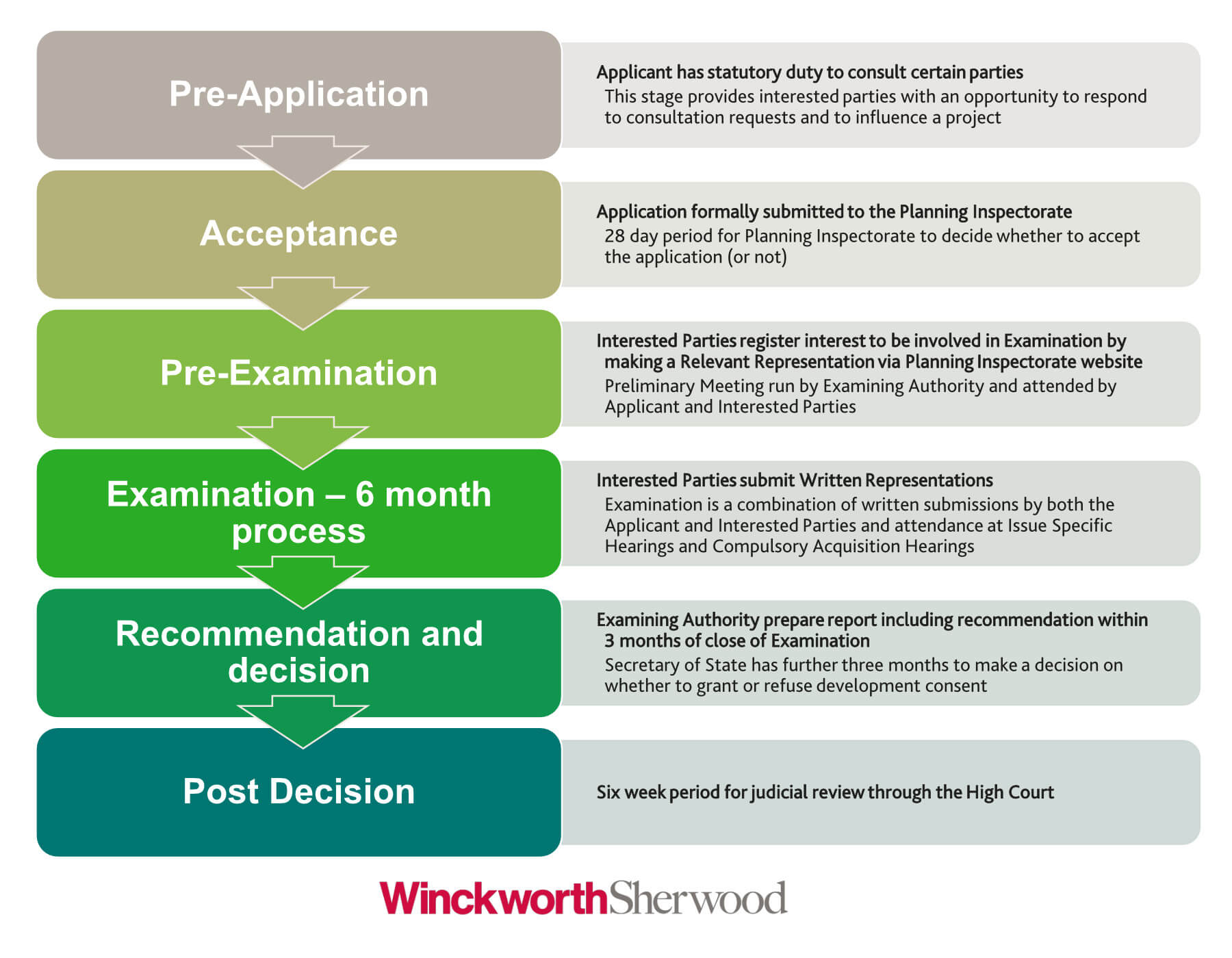
This guide provides a high-level overview of the DCO process. A Development Consent Order (DCO) is an order which, if made, provides planning permission for a “Nationally Significant Infrastructure Project”, which are large scale developments, relating to energy, transport, water and waste. Unlike planning permissions for smaller schemes, DCOs also provide a range of other consents. They are a “one stop shop” because they aim to wrap up most of what a developer needs – such as compulsory purchase of land and environmental and marine consents – into one document and process.
DCO’s were introduced by the Planning Act 2008 (amended by the Localism Act 2011) and were intended to provide a streamlined consent process for major infrastructure projects and to make it easier for parties affected to take part in the process.
Applications for DCO’s are submitted to the Planning Inspectorate, and it is the Planning Inspectorate that oversees the Examination process (see more on this below) – however it is the relevant Secretary of State that makes the final decision on all applications for DCO’s.
Guide to the process of obtaining a DCO
Steps to getting a DCO
Pre-application consultation
The Applicant for a DCO must carry out pre-application consultation, including, if relevant, on its Environmental Impact Assessment (EIA). There should be specific consultation of, for example, impacted landowners. There should also be broader consultation for the local community. Before starting formal consultation, the Applicant will prepare a Statement of Community Consultation containing its consultation strategy and local authorities have opportunity to comment on a draft of this document.
Planning Inspectorate (PINS) Advice Note 8.1 (Responding to the developer’s pre-application consultation) sets out how those in the local community can be involved in an Applicant’s pre-application consultation. At this stage the Application will not have been finalised and so it is the key opportunity for individuals and organisations to seek to influence what ends up in the Application which is submitted to the Planning Inspectorate.
It is important for Applicants to engage fully in this process, to properly consider the issues raised by the community and adjust the Application accordingly and keep good records of the consultation undertaken.
Relevant Representation
Once the Applicant has submitted the Application, PINS has 28 days to decide whether to accept it. If it is accepted, PINS will then announce a period of at least 28 days during which individuals and organisations can register to be an Interested Party (IP).
To register, a party must submit a Relevant Representation (RR) by completing the relevant form either online or in hard copy. PINS Advice Note 8.2 (How to register to participate in an Examination) explains how to complete a RR.
After registering, a party will officially become an IP to the Examination. This means that they will have a right to participate in the examination process by making representations in writing and at Hearings if relevant. IPs can use the Examination period of six months to build on the comments initially made in the RR.
Preliminary meeting and start of Examination
Once the period for registration has finished, the Examining Authority (ExA) will hold a Preliminary Meeting to discuss the procedure of how the Examination will be carried out. A draft Examination Timetable will be shared beforehand as part of the ‘Rule 6 letter’ and IPs and the Applicant should take the opportunity to comment during this meeting.
Local Impact Reports
Local Impact Reports (LIRs) are produced by relevant local authorities as part of the Examination process. The ExA will set a deadline for their submission, usually early in the timetable.
LIRs are intended to give information on the likely impact of the proposed development on a local authority’s area and its content is for the local authority to determine. Further guidance on LIRs is available in PINS Advice Note One (Local Impact Reports).
Local authorities are still able to submit a separate Written Representation, on which see below.
Written Representations
Written Representations are the opportunity for all IPs to set out their case in full. The ExA will set a deadline for their submission, usually early in the Examination Timetable.
There is no particular format which WRs must be presented in. However, they should cover the whole of the IP’s detailed case and refer to specific elements of the Application.
Statements of Common Ground
Statements of Common Ground (SoCGs) are produced jointly between the Applicant and an IP. The Applicant usually takes the lead on preparing SoCGs and generally prepares them only for Statutory Undertakers and other key stakeholders. They should present the areas of agreement and disagreement between the parties. They help the ExA in understanding the issues between the Applicant and other IPs and helping to reduce them where possible.
Recently, ExAs have also asked for the production of Principal Areas of Disagreement Summary Statements (PADS). These have proved useful where a SoCG is particularly long and so a separate document is produced to summarise the areas of disagreement.
For Statutory Undertakers, discussions around the SoCG will often involve negotiation of a set of Protective Provisions. These are provisions provided within the DCO governing the relationship between the developer and the undertaker during construction and operation of the authorised development.
Written Questions or Requests for Information
Throughout the Examination, the ExA is able to issue written questions (WQs) or a request for information from specific parties. Written questions can be open to all parties in the Examination or addressed to particular IPs or the Applicant. If the ExA ask you to respond to a question (or for further information) it is important to respond by the relevant Deadline.
Site Inspections
The ExA will visit the location of the proposed development either through an unaccompanied site inspection (where they are able to see the location from public land) or an accompanied site inspection (where access to private land is required or IPs need to be present to identify particular features).
Issue Specific Hearings (ISHs)
The ExA will call ISHs to discuss a specific issue in detail. They will decide on the topics for these Hearings from their review of RRs and WRs as well as information which comes to light over the course of the Examination period. It is usual practice for a Hearing or Hearings to be held to discuss the detail of the drafting of the DCO.
Both IPs and the Applicant will be given opportunities to speak and ISHs can be in person, hybrid or virtual events. An Agenda will be released before the ISH and is used to guide discussions.
Open Floor Hearings
These hearings are not linked to a specific topic but are an opportunity for parties to speak to the ExA about issues relevant to them. There can be more than one held, but they are generally used to raise issues that are not specifically dealt with at other hearings.
Compulsory Acquisition Hearings (CAHs)
The ExA must hold a CAH where the DCO would authorise compulsory acquisition of land. They can be attended by any Affected Person which means any individual or organisation who has an interest in land that is subject to compulsory acquisition powers.
Changes to Applications after Acceptance
It is possible for an Applicant to request a change to an Application after it has been accepted for Examination. PINS Advice Note Sixteen (Requests to change applications after they have been accepted for examination) provides detail on how the ExA will approach both a material change request and non-material change request.
Recommendation and decision
At the end of the Examination period the ExA will make a recommendation to the relevant Secretary of State and the Secretary of State is then required to make a decision within 3 months of that recommendation. The Secretary of State decides the application in accordance with any relevant National Policy Statement (NPS) except in specific circumstances.
Challenging a decision
Following a decision by the Secretary of State, there is a six-week period during which the decision can be challenged through judicial review. If there is no challenge, the Secretary of State can make the DCO so that the Applicant can go on to acquire the land and rights it needs before moving on to construct and operate the project.



